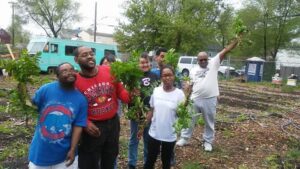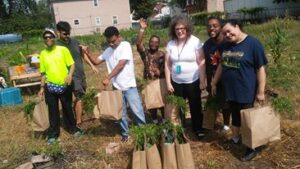Project Overview
Commodities
- Fruits: berries (other)
- Vegetables: greens (leafy), greens (lettuces)
- Animals: bees
Practices
- Animal Production: heritage breeds
- Crop Production: cover crops, intercropping, pollinator habitat, postharvest treatment, seed saving, shade cloth, water storage
- Education and Training: display, workshop, youth education
- Farm Business Management: apprentice/intern training, community-supported agriculture, farmers' markets/farm stands, labor/employment, whole farm planning
- Natural Resources/Environment: wildlife
- Pest Management: cultivation, mulches - general, prevention
- Production Systems: organic agriculture
- Soil Management: composting, earthworms, soil quality/health
- Sustainable Communities: community development, community planning, ethnic differences/cultural and demographic change, quality of life, social capital, urban agriculture
Abstract:
Special needs youth and youth with developmental disabilities will grow, market, and sell produce at our farmstand, learn cultivation, business, and community relation skills key to financial sustainability in urban agriculture while creating equitable access to fresh organic produce.

Youth will perform farmwork informed by concepts of sustainable farming and workdays at local farms. During farmstand, students will lead tours of the farm, perform cooking demonstrations, and manage sales and data. Youth will regularly share experiences via social media.
Youth will participate in an on-site farmstand where they participate in the harvesting, packing, and sales of produce to the local community. They will participate in outreach efforts involving fliering, and will learn the ins and outs of operating an on-site community farmstand. Youth will exhibit project experience at the Fall Harvest Festival.
Project objectives:
- Encourage Special Needs Youth to develop leadership skills through leading farm tours and designing cooking demonstrations for the farmstand
- Provide hands-on organic farming experience in the growing, harvesting, and packing of culturally-relevant crops
- Give youth experience in community outreach and advertising using social media and direct marketing
- Create a product—the Community Cookbook—to share the success of the farmstand (pounds of produce sold, income generated, customer attendance), and community impact (youth
 reflections, customer testimonies, recipes)
reflections, customer testimonies, recipes) - Educate Youth on inclusivity and active listening to sustain a positive, safe, and welcoming environment at the farm and farmstand